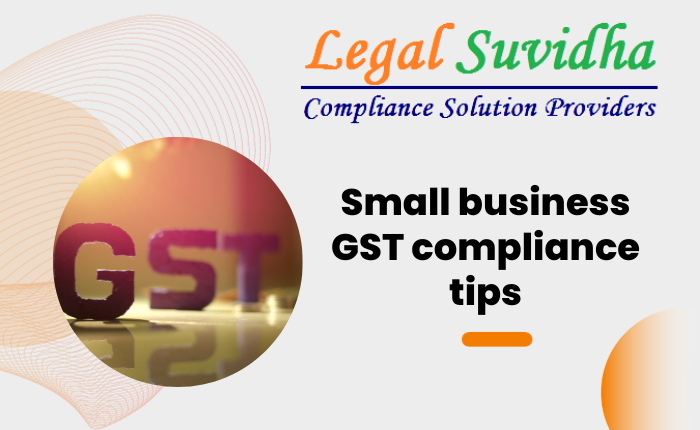Small and medium-sized enterprises (SMEs) serve as the cornerstone of the Indian economy, playing important roles in export, GDP growth, job creation, and fostering inclusive economic development. However, some SMEs perceive the Goods and Services Tax (GST) as having substantially increased their compliance costs. The GST, a landmark tax reform implemented post-independence, has presented specific challenges for both consumers and businesses. This article explains how small businesses can follow GST rules, identifies common challenges, and offers a GST Compliance checklist.
Understanding GST:
GST, or Goods and Services Tax, represents an indirect value-added tax applied to the majority of goods and services intended for domestic consumption. Consumers bear the GST burden through GST Returns, while businesses selling these goods and services are responsible for remitting the tax to the government.
GST Returns:
GST Returns are comprehensive documents that disclose all income, sales, expenses, and purchases that GST-registered taxpayers must report to tax authorities. These returns typically encompass details such as sales, Input Tax Credit (ITC) on purchases, and output GST on sales, among others.
Crucial Significance of GST Compliance:
GST compliance encompasses adherence to the rules and regulations stipulated under the Goods and Services Tax (GST) framework. It entails the timely submission of returns, and tax payments, and the accurate recording of information in invoices. Complying with GST regulations is vital as it shields businesses from penalties and upholds a favorable GST compliance rating. This rating, assigned by the government, evaluates factors like punctual return filing, precise input credit disclosure, and tax payments.
GST Compliance Checklist for Taxpayers:
A GST compliance checklist can be categorized into three main components:
1. Return Filing Compliance: Ensuring timely and accurate filing of GST returns.
2. Registration Requirements: Adhering to the compliance prerequisites for GST registration.
3. Tax Invoice Compliance: Maintaining proper tax invoice records in accordance with GST regulations.
Challenges Faced by SMEs in Achieving GST Compliance:
1. Lack of Adequate Tools: Many small businesses struggle with GST compliance due to their inability to generate, retain, or record invoices that serve as proof of payment.
2. Financial Constraints: Limited financial resources often lead new businesses to assign inadequate accounting resources. Engaging a qualified accountant or opting for cost-effective accounting services from third parties can help address this challenge.
3. Software Adaptation: Numerous companies employ accounting or Enterprise Resource Planning (ERP) systems for compliance purposes. The transition to GST may necessitate adjustments to existing ERPs or the acquisition of new GST-compliant software.
4. Professional Knowledge Gap: The absence of requisite professional knowledge is a prominent obstacle for SMEs attempting to comply with GST regulations.
How can small companies make sure they follow the GST rules?
1. Tax Software Help: If a small business uses accounting and GST software, it can reach out to the experts from the software company for guidance. These experts can explain how to use the software for GST and help with any questions about filing returns.
2. Organize Receipts and Payments: Small businesses can set up a system to match receipts with payments. They can also use payment gateways to automate invoicing and receipt creation, making it easier to keep track of their finances.
3. Keep Financial Records: Small businesses should create and send account statements to customers, track money owed to them, and send reminders for payments. They should also maintain records of their purchases, transactions, and money they owe to suppliers.
In summary, GST is a tax on goods and services in India. Small businesses can save money on GST compliance by following these suggestions and using the tips in the article. This way, they can have more funds available for other parts of their business.
If You have any queries then connect with us at [email protected] or [email protected] & Contact us & stay updated with our latest blogs & articles


![Received an Income Tax Notice in India? Don’t Panic — Here’s Exactly What to Do [2025 Guide] 1 Income Tax Notice](https://legalsuvidha.com/wp-content/uploads/2025/12/Income-Tax-Notice.png)
![Cyber Crime FIR in India: How to File Complaint for Online Fraud, Banking Fraud & Digital Harassment [2025 Guide] 2 Cyber Crime Complaint](https://legalsuvidha.com/wp-content/uploads/2025/12/Cyber-Crime-Complaint.png)
![Trademark Infringement in India: How to File Legal Action & Protect Your Brand [2025 Guide] 3 Tradenark Infrigement](https://legalsuvidha.com/wp-content/uploads/2025/12/Tradenark-Infrigement.png)
![Property Title Verification in India: How to Check Clear Title in 7 Steps [Avoid Property Fraud – 2025 Guide] 4 Property Titles Verification](https://legalsuvidha.com/wp-content/uploads/2025/12/Property-Titles-Verification.png)



